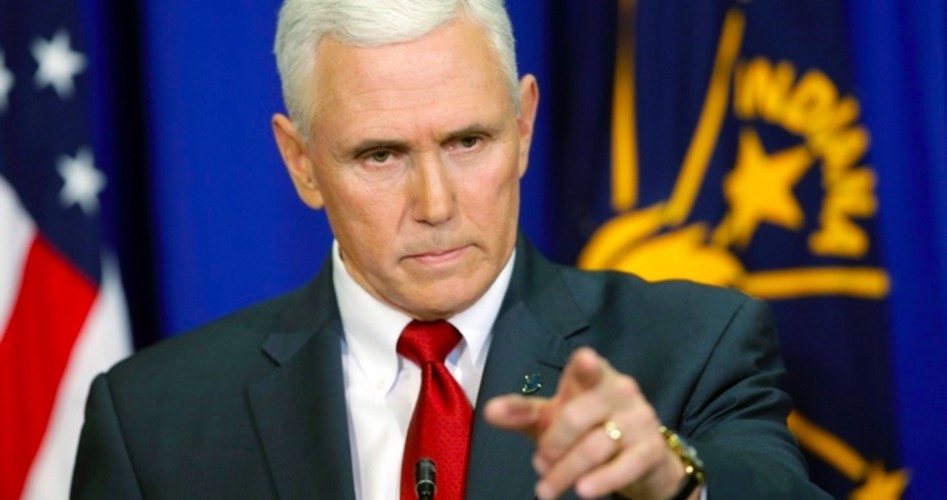
Indiana Republicans possibly were trying to do their best impression of a cheap tent, but there perhaps hasn’t been such a quick folding since the collapse of the Maginot Line.
The state’s Religious Freedom Restoration act, despite Governor Mike Pence’s feints to the contrary, was clearly intended to offer protection to bakers, florists, wedding planners, and anyone else who objects to participating in faux weddings and other events contrary to his conscience. Instead, after a media maelstrom, pugnacious protesting, and big-money maneuvering, an amendment to the legislation has rendered it an exercise in cowardly posturing.
Passed by the GOP-controlled Indiana legislature and signed by Pence Thursday evening, the law has perhaps been mischaracterized by some. CNN claims it offers “protections based on sexual orientation” for the first time in Indiana’s history. Yet it seems that American Thinker is correct in stating that with the amendment, “the law in essence has become meaningless.” It appears that the Indiana Republicans — rattled by the politically correct backlash but wanting to pacify social conservatives — just wanted to pass something bearing the name “Religious Freedom Restoration Act.”
But it certainly won’t restore faith in government. While the law doesn’t appear to offer any new cudgels to use against businessmen exercising their religious rights, it also states that it cannot be used to justify discrimination. As Fox News reports, “House Speaker Brian Bosma said the law sends a ‘very strong statement’ that the state will not tolerate discrimination.” “Discrimination.” That’s a big word — and a wholly misunderstood concept.
We cannot have an intelligent, productive discussion about a matter if we’re not honest — not even with ourselves — with respect to our language and what we’re actually doing. And the fact is not only that the government doesn’t prohibit “discrimination” in principle, but that it discriminates when prohibiting discrimination in the particular.
Note that government outlaws discrimination only against “protected classes” (read: privileged classes), which leaves other classes unprotected and creates unequal treatment under the law. In other words, perhaps you can’t discriminate against homosexuals, but Republicans, libertarians, gun owners, pro-lifers, and most other groups are fair game.
In reality, though, those who would force business owners to service affairs they find morally objectionable are wrong on many counts. First, the supposition that it’s government’s role and right to prevent certain kinds of private-sector discrimination is a false one. And the operative principle here is freedom of association. Consider: No one denies you the right to include in, or exclude from, your home whomever you please. If you want to refuse entry to Catholics, blacks, whites, conservatives, liberals, or coffee drinkers, that’s your prerogative.
So why should you lose that right simply because you decide to erect a few more tables and sell food?
Or cakes or flowers?
Why?
It’s still your property, paid for with your money and created by the sweat of your own brow. Why should your private property rights and freedom of association be abrogated because you decide to engage in commerce?
Some will now point out there is such thing as unjust discrimination. This is irrelevant if you believe in freedom of association. For just as with freedom of speech, the principle means nothing unless even unpopular exercises of it are protected. After all, popular exercises’ popularity is usually protection enough.
Moreover, how is the government qualified to determine what constitutes unjust discrimination? One may say that the racial variety is an open-and-shut case, but is this really true? Consider that a German or West Indian restaurant might wish to hire, respectively, only white or only black waitstaff for the purposes of authenticity. Some might object, saying that the establishment should retain the first qualified person who comes along. But what constitutes qualifications?
I know of a female gynecologist who will only hire a woman assistant because she assumes this will make her exclusively female patients more comfortable. It’s also conceivable that daycare centers might prefer hiring women. And the top 10 female fashion models earned 10 times as much in 2013 as did their male counterparts. Unjust? The ignoring of qualifications?
Maybe not. A model’s qualifications involve far more than the ability to parade up and down a runway. The job actually involves attracting and pleasing a market. This is why being attractive, and not ugly, is a qualification. And given that women models obviously have a more lucrative market, it’s why “being female” is integral to maximizing modeling success. Likewise, if male staff members make customers less likely to frequent a gynecological office or daycare center, are they as “qualified” for that role as female staff?
Now, what of having waitstaff of the “wrong race” in a restaurant? If the reduction in authenticity diminishes business, isn’t being of the relevant race integral to the job qualifications?
And, of course, such judgments are often tolerated, as no one takes up the cudgels for men who might apply for jobs in daycare centers or gynecological offices. It’s only politically incorrect racial and sex discrimination that gets attention.
Yet even if you accept the discriminatory practice of protecting some people from private-sector discrimination, the fact remains that the bakers, florists, and other businessmen at the center of the homosexual-privileges controversy have not refused service to certain people. They have refused to service certain events.
And events enjoy no legal protections.
Some of the assailed Christian businessmen have made this point, and it goes without saying that homosexuals have patronized their establishments. None of these businesses has erected a sign stating “No shoes, no shirt, no heterosexuality, no service,” and if someone wants a Mother’s Day flower bouquet or birthday cake, no one administers a sexuality test before purchase.
And are we now going to compel people to be party to events they find morally objectionable? As has been so frequently asked, would we force a Jewish or black businessman to cater a Nazi or KKK affair? Is that the American way?
Lastly, when the matter is wedding cakes and certain other services, freedom of speech is a factor as well. As I wrote in the February piece “How to Win the Christian Baker/Same-Sex ‘Wedding’ Cake Debate”:
[T]he bakers in question are not refusing service to a type of people — they are refusing to be party to a type of message. This is not debatable. When you put writing on a same-sex “wedding” cake, you’re crafting a message; if you place figurines (of two men, for instance) on that cake, you’re erecting symbols relating that message. Note here that the Supreme Court has already ruled that “Symbolic Speech” — a legal term in U.S. law — is protected under the First Amendment; examples of such rulings would be that pertaining to flag-burning and the Tinker v. Des Moines case.
And can we compel people to participate in the creation of a message? Forced speech is not free speech.
Unfortunately, though, reasoned appeals fail when people operate based on emotion. You are then left only with passion, which, Ben Franklin warned, governs but “never governs wisely.” I wonder if he ever thought that America would become a most passionate state.
Photo of Gov. Mike Pence: AP Images


